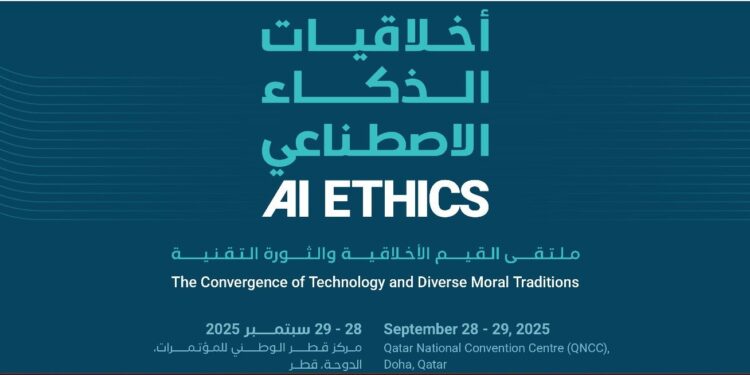Tech giants, university researchers, and policy makers will gather at Qatar National Convention Center for two days for a conference that could change how artificial intelligence respects diverse cultural traditions.
Hamad Bin Khalifa University (HBKU) will host the conference, tittled, “AI Ethics: The Convergence of Technology and Diverse Moral Traditions” on September 28-29, 2025. The event will tackle a question Silicon Valley prefers to avoid, which is, whose values should guide AI systems affecting billions of people worldwide?
Tech Industry Faces Cultural Reckoning
Healthcare algorithms, financial lending systems, and security software make decisions about people’s lives daily. Yet most AI ethics discussions happen in Western boardrooms, ignoring how different cultures view privacy, authority, and human dignity.
The Doha conference breaks this pattern. Speakers from MIT, Microsoft, University of Vienna, and Peking University will debate how global AI standards can respect local traditions without compromising safety.
“Technology innovation outpaces regulatory frameworks worldwide,” HBKU states in their conference announcement. “Meaningful international action is needed to ethically shape rules that protect cultural and human norms.”
Six Critical AI Battlegrounds Under Scrutiny
The conference examines AI ethics across six areas where cultural differences create the biggest tensions:
- Healthcare AI bias prevention explores how medical algorithms trained on Western data miss symptoms in other populations. Dr. Nancy Jecker from University of Washington brings expertise in global health ethics.
- Smart city development without surveillance overreach examines how urban AI systems balance efficiency with privacy expectations that vary dramatically between cultures. Daniel González-Bootello from Smart City Cluster leads this discussion.
- Financial AI fairness across diverse economic systems looks at how lending algorithms and trading systems reflect Western financial assumptions that may harm other economic models.
- Educational AI personalization without deepening inequality studies how AI tutoring systems can adapt to different learning styles without reinforcing social divisions.
- Workplace automation impact on traditional employment structures considers how AI job displacement affects societies with different social safety nets and work cultures.
- Security AI deployment respecting civil liberties debates surveillance technology limits in societies with varying views on government authority and individual privacy.
Middle East Emerges as AI Ethics Leader
The Middle East challenges Western dominance in AI ethics discussions. The Arab League Educational, Cultural and Scientific Organization (ALECSO) recently adopted the first AI ethical code protecting Arab values in higher education.
UAE issued an AI Charter in 2024 emphasizing governance, transparency, and privacy principles adapted to local cultural values. Saudi Arabia and other Gulf nations develop AI frameworks integrating Islamic ethics concepts like justice, dignity, and public welfare.
“Middle Eastern countries generally favour ‘soft law’ approaches through guidelines, principles, and frameworks rather than rigid legislation,” notes AI policy expert Haydar Al-Rikabi.
Global Stakes Rise as AI Accelerates
The United States pushes AI executive orders while Europe implements comprehensive AI Acts. China develops algorithmic governance rules that prioritize social stability. Meanwhile, emerging economies demand seats at the ethics table.
Without international coordination, companies face institutional risks from conflicting regulations. Communities suffer when AI systems reflect narrow worldviews that ignore local needs and values.
HBKU frames the conference as “collective responsibility” requiring collaboration across disciplines, geographies, and traditions. This contrasts sharply with the predominantly Western-centric debates dominating global AI discussions.
Conference Opens Doors for Media Coverage
Credentialed journalists gain access to keynote sessions, expert panels, and one-on-one interviews with featured speakers. The event provides rare opportunities to question top AI researchers and industry leaders about how cultural diversity should shape technology development.
The conference agenda and complete speaker list remain available through HBKU’s official channels, with media accreditation handled through media@hbku.edu.qa.














